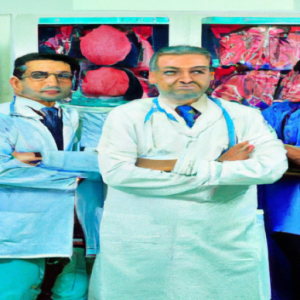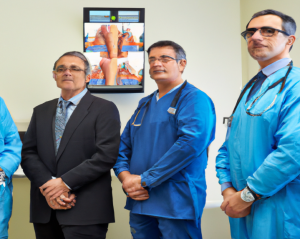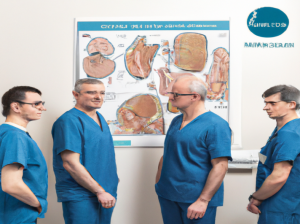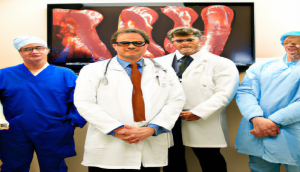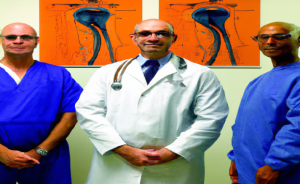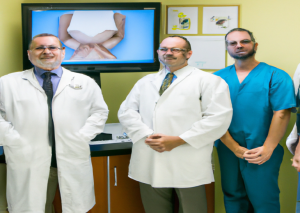Geriatric urologist – who is it?
Medicine specialists and geriatric urologists concentrate on the urological health of the elderly, treating ailments that worsen or become more common as people age. This topic is vital since several urological problems tend to become more common as people age, including erectile dysfunction, bladder prolapse, urine incontinence, urinary tract infections (UTIs), benign prostatic hyperplasia (BPH), and prostate cancer.
- Expert urologists consulting in a modern clinic, utilizing the latest medical advancements to offer personalized care. Their dedication to men’s health is evident in their focused discussions and patient-centric approach.
- Advanced urological care in action, showcasing a team of skilled professionals using state-of-the-art equipment to diagnose and treat complex conditions, ensuring every patient receives the best possible care.
Geriatric urologists are important because of the way they treat the elderly. They are aware of the physiological alterations brought on by aging and how these alterations affect the reproductive and urinary systems. For instance, the successful management of urine incontinence, a disorder that affects a large percentage of the senior population, calls for careful and specialized treatment. Urinary incontinence is a major concern in geriatric care since research indicates that up to 30% of older persons in community settings and up to 50% in nursing facilities have some form of it.

Innovative urology: Blending cutting-edge technology with unparalleled expertise. Here, specialists are seen leveraging the latest medical advancements to revolutionize patient treatment and care.
Furthermore, geriatric urologists are skilled in handling the challenges of caring for senior patients, many of whom have chronic illnesses. To prevent negative interactions, they make sure that urological problem treatments are meticulously synchronized with the patient’s overall healthcare plan, accounting for any other drugs or therapies the patient may be receiving.
Beyond curing illnesses, they also provide advice on how to keep urinary health, avoid future problems, and modify lifestyle choices to reduce symptoms. To manage chronic illnesses and enhance older individuals’ quality of life, a comprehensive approach is essential.
Geriatric urologists treat prostate diseases, which are common in older men. They provide a variety of therapy choices based on the patient’s preferences, health status, and severity of the illness. Their knowledge is essential for managing these illnesses in a way that takes into account the possible advantages and disadvantages of various treatment approaches.

The face of modern urology: An expert care team, united in their mission to advance men’s health through evidence-based practices and compassionate care.
To sum up, geriatric urologists are essential in making sure that senior citizens get customized urological treatment that meets their specific requirements. To manage urological diseases while avoiding risks and enhancing general health and well-being in older patients, their knowledge is essential.
Geriatric urologists treat a wide range of illnesses that mostly affect the elderly, with a particular emphasis on disorders of the reproductive and urinary systems. Every ailment affects the body at the biochemical and physiological levels and presents a different set of difficulties that may either lower or increase a person’s quality of life. Comprehending these ailments and their management emphasizes the need to seek advice from a geriatric urologist.
- victoria urologists
- Advanced urological care in action, showcasing a team of skilled professionals using state-of-the-art equipment to diagnose and treat complex conditions, ensuring every patient receives the best possible care.
- Compassionate care by professional urologists, captured in a moment of thoughtful patient consultation. This image reflects the empathy and understanding that forms the core of our clinical practice.
- Cutting-edge urology: Where science meets health. This photo depicts urologists engaged in groundbreaking research and application, pushing the boundaries of medical science for better patient care.
The inability to urinate
The involuntary leaking of urine known as urinary incontinence is caused by weakened pelvic floor muscles and age-related changes in the urinary tract’s functionality. This may result in decreased bladder capacity and altered brain control over bladder function at the biochemical level. Significant effects on day-to-day functioning result in social shame, a higher incidence of UTIs, and a notable decline in life quality. Exercises targeting the muscles of the pelvic floor, bladder training, and, in some situations, surgery to enhance bladder control are possible treatment approaches.

Compassionate care by professional urologists, captured in a moment of thoughtful patient consultation. This image reflects the empathy and understanding that forms the core of our clinical practice.

Cutting-edge urology: Where science meets health. This photo depicts urologists engaged in groundbreaking research and application, pushing the boundaries of medical science for better patient care.
UTIs, or urinary tract infections
Due to immune system deterioration, insufficient bladder emptying, and, in males, enlarged prostates that may obstruct urine flow, UTIs are more frequent in the elderly. According to biochemistry, a UTI is caused by bacteria invading the urinary system, which causes inflammation and a variety of symptoms including fever, urgency, and discomfort while urinating. Over time, chronic UTIs may worsen renal function and cause more serious kidney infections. Aging urologists treat urinary tract infections (UTIs) using medications appropriate to the bacteria in question as well as techniques to enhance bladder emptying and cleanliness.
- Cutting-edge urology: Where science meets health. This photo depicts urologists engaged in groundbreaking research and application, pushing the boundaries of medical science for better patient care.
- Women’s Urological Health
- Expert urologists consulting in a modern clinic, utilizing the latest medical advancements to offer personalized care. Their dedication to men’s health is evident in their focused discussions and patient-centric approach.
Bladder Relapse
When the pelvic support structures in the pelvis fail and the bladder falls into the vaginal canal, it is known as bladder prolapse or cystocele. Urinary retention, incontinence, and recurrent urinary tract infections are the results of this disorder, which alters the normal location and function of the bladder. Physiologically speaking, the prolapse may alter urine flow and, if addressed, result in kidney damage and bladder stones. Exercises that strengthen the pelvic floor, pessary devices, or surgical repair to restore normal anatomy and function may all be part of the treatment.
Disorders of the Prostate
Older men are more likely to suffer from prostate problems, such as benign prostatic hyperplasia (BPH) and prostate cancer. Urine retention and blockage are caused by the prostate gland’s enlargement in BPH. Biochemically, this is linked to changes in hormones, such as elevated dihydrotestosterone (DHT) levels. Prostate cell proliferation that is out of control is a factor in prostate cancer. Urinary problems, discomfort, and the possibility of cancer spreading are among the health effects that negatively influence quality of life. Options for treatment include hormone therapy, prescription drugs to control symptoms, and surgery to remove the tumor or prostate gland.
- Behind the scenes: Urologists preparing for surgery, exemplifying the meticulous planning and precision that goes into every procedure to ensure patient safety and success.
- Our surgeons practice
- “Urology specialists engaged in deep discussion about patient care, highlighting their commitment to continuous learning and collaboration in the pursuit of better health outcomes for men.
- A dynamic urology team strategizing for optimal patient outcomes. Their collective expertise in men’s health issues forms a strong foundation for effective treatment planning.
- Focused urology experts in a clinical conference, deeply engaged in exchanging knowledge and insights to stay at the forefront of urological medicine.
- Urology with a personal touch: Patient consultations. This image shows the warm, patient-centered environment where individual needs and concerns are addressed with care and professionalism.
Impotence
Age-related erectile dysfunction (ED) is often a complex condition combining hormonal, neurological, and vascular alterations. Lower testosterone levels, impaired blood flow, and nerve damage may all make it more difficult to get or keep an erection. Relationships, self-esteem, and emotional well-being may all be greatly impacted by ED. Pharmacotherapy, lifestyle changes, and, in some situations, gadgets or surgery to enhance erectile function are all part of the treatment plan.
The Value of Seeing an Elderly Urologist
These disorders demonstrate the complex interactions between urological health and aging. The biochemical and physiological changes that go with aging may significantly affect a person’s quality of life, which is why a geriatric urologist’s knowledge is quite useful. Geriatric urologists serve a critical role in treating these disorders, reducing their impact on health, and ultimately enhancing the quality of life for older persons by offering specialized treatment that is customized to their needs. It is impossible to overestimate the value of seeing a geriatric urologist since proper therapy and early identification of urological issues may greatly improve a person’s functioning and overall well-being as they age.
Read also: Men’s health – what you need to know

State-of-the-art urology facilities in use, illustrating the clinic’s investment in high-quality healthcare infrastructure to enhance diagnostic and treatment capabilities.




